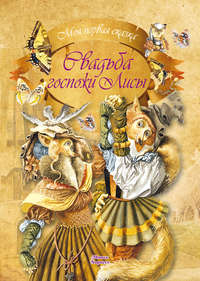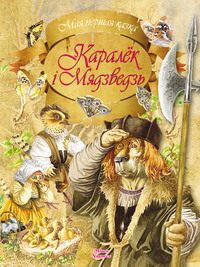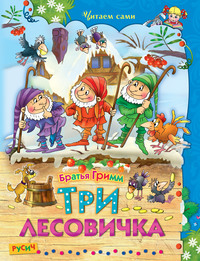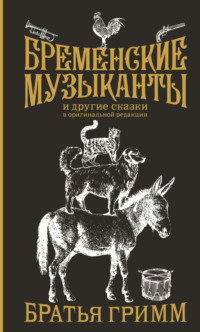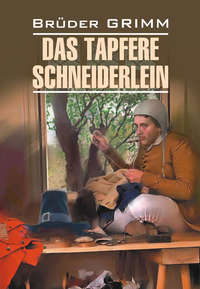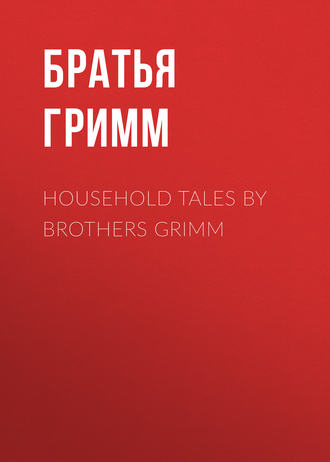 полная версия
полная версияHousehold Tales by Brothers Grimm
"Well, what does she want, then?" said the Flounder. "Alas," said he, "she wants to be like unto God." "Go to her, and you will find her back again in the dirty hovel." And there they are living still at this very time.
20 The Valiant Little Tailor
One summer's morning a little tailor was sitting on his table by the window; he was in good spirits, and sewed with all his might. Then came a peasant woman down the street crying, "Good jams, cheap! Good jams, cheap!" This rang pleasantly in the tailor's ears; he stretched his delicate head out of the window, and called, "Come up here, dear woman; here you will get rid of your goods." The woman came up the three steps to the tailor with her heavy basket, and he made her unpack the whole of the pots for him. He inspected all of them, lifted them up, put his nose to them, and at length said, "The jam seems to me to be good, so weigh me out four ounces, dear woman, and if it is a quarter of a pound that is of no consequence." The woman who had hoped to find a good sale, gave him what he desired, but went away quite angry and grumbling. "Now, God bless the jam to my use," cried the little tailor, "and give me health and strength;" so he brought the bread out of the cupboard, cut himself a piece right across the loaf and spread the jam over it. "This won't taste bitter," said he, "but I will just finish the jacket before I take a bite." He laid the bread near him, sewed on, and in his joy, made bigger and bigger stitches. In the meantime the smell of the sweet jam ascended so to the wall, where the flies were sitting in great numbers, that they were attracted and descended on it in hosts. "Hola! who invited you?" said the little tailor, and drove the unbidden guests away. The flies, however, who understood no German, would not be turned away, but came back again in ever-increasing companies. The little tailor at last lost all patience, and got a bit of cloth from the hole under his work-table, and saying, "Wait, and I will give it to you," struck it mercilessly on them. When he drew it away and counted, there lay before him no fewer than seven, dead and with legs stretched out. "Art thou a fellow of that sort?" said he, and could not help admiring his own bravery. "The whole town shall know of this!" And the little tailor hastened to cut himself a girdle, stitched it, and embroidered on it in large letters, "Seven at one stroke!" "What, the town!" he continued, "The whole world shall hear of it!" and his heart wagged with joy like a lamb's tail. The tailor put on the girdle, and resolved to go forth into the world, because he thought his workshop was too small for his valour. Before he went away, he sought about in the house to see if there was anything which he could take with him; however, he found nothing but an old cheese, and that he put in his pocket. In front of the door he observed a bird which had caught itself in the thicket. It had to go into his pocket with the cheese. Now he took to the road boldly, and as he was light and nimble, he felt no fatigue. The road led him up a mountain, and when he had reached the highest point of it, there sat a powerful giant looking about him quite comfortably. The little tailor went bravely up, spoke to him, and said, "Good day, comrade, so thou art sitting there overlooking the wide-spread world! I am just on my way thither, and want to try my luck. Hast thou any inclination to go with me?" The giant looked contemptuously at the tailor, and said, "Thou ragamuffin! Thou miserable creature!"
"Oh, indeed?" answered the little tailor, and unbuttoned his coat, and showed the giant the girdle, "There mayst thou read what kind of a man I am!" The giant read, "Seven at one stroke," and thought that they had been men whom the tailor had killed, and began to feel a little respect for the tiny fellow. Nevertheless, he wished to try him first, and took a stone in his hand and squeezed it together so that water dropped out of it. "Do that likewise," said the giant, "if thou hast strength?" "Is that all?" said the tailor, "that is child's play with us!" and put his hand into his pocket, brought out the soft cheese, and pressed it until the liquid ran out of it. "Faith," said he, "that was a little better, wasn't it?" The giant did not know what to say, and could not believe it of the little man. Then the giant picked up a stone and threw it so high that the eye could scarcely follow it. "Now, little mite of a man, do that likewise." "Well thrown," said the tailor, "but after all the stone came down to earth again; I will throw you one which shall never come back at all." And he put his hand into his pocket, took out the bird, and threw it into the air. The bird, delighted with its liberty, rose, flew away and did not come back. "How does that shot please you, comrade?" asked the tailor. "Thou canst certainly throw," said the giant, "but now we will see if thou art able to carry anything properly." He took the little tailor to a mighty oak tree which lay there felled on the ground, and said, "If thou art strong enough, help me to carry the tree out of the forest." "Readily," answered the little man; "take thou the trunk on thy shoulders, and I will raise up the branches and twigs; after all, they are the heaviest." The giant took the trunk on his shoulder, but the tailor seated himself on a branch, and the giant who could not look round, had to carry away the whole tree, and the little tailor into the bargain: he behind, was quite merry and happy, and whistled the song, "Three tailors rode forth from the gate," as if carrying the tree were child's play. The giant, after he had dragged the heavy burden part of the way, could go no further, and cried, "Hark you, I shall have to let the tree fall!" The tailor sprang nimbly down, seized the tree with both arms as if he had been carrying it, and said to the giant, "Thou art such a great fellow, and yet canst not even carry the tree!"
They went on together, and as they passed a cherry-tree, the giant laid hold of the top of the tree where the ripest fruit was hanging, bent it down, gave it into the tailor's hand, and bade him eat. But the little tailor was much too weak to hold the tree, and when the giant let it go, it sprang back again, and the tailor was hurried into the air with it. When he had fallen down again without injury, the giant said, "What is this? Hast thou not strength enough to hold the weak twig?" "There is no lack of strength," answered the little tailor. "Dost thou think that could be anything to a man who has struck down seven at one blow? I leapt over the tree because the huntsmen are shooting down there in the thicket. Jump as I did, if thou canst do it." The giant made the attempt, but could not get over the tree, and remained hanging in the branches, so that in this also the tailor kept the upper hand.
The giant said, "If thou art such a valiant fellow, come with me into our cavern and spend the night with us." The little tailor was willing, and followed him. When they went into the cave, other giants were sitting there by the fire, and each of them had a roasted sheep in his hand and was eating it. The little tailor looked round and thought, "It is much more spacious here than in my workshop." The giant showed him a bed, and said he was to lie down in it and sleep. The bed, however, was too big for the little tailor; he did not lie down in it, but crept into a corner. When it was midnight, and the giant thought that the little tailor was lying in a sound sleep, he got up, took a great iron bar, cut through the bed with one blow, and thought he had given the grasshopper his finishing stroke. With the earliest dawn the giants went into the forest, and had quite forgotten the little tailor, when all at once he walked up to them quite merrily and boldly. The giants were terrified, they were afraid that he would strike them all dead, and ran away in a great hurry.
The little tailor went onwards, always following his own pointed nose. After he had walked for a long time, he came to the courtyard of a royal palace, and as he felt weary, he lay down on the grass and fell asleep. Whilst he lay there, the people came and inspected him on all sides, and read on his girdle, "Seven at one stroke." "Ah," said they, "What does the great warrior here in the midst of peace? He must be a mighty lord." They went and announced him to the King, and gave it as their opinion that if war should break out, this would be a weighty and useful man who ought on no account to be allowed to depart. The counsel pleased the King, and he sent one of his courtiers to the little tailor to offer him military service when he awoke. The ambassador remained standing by the sleeper, waited until he stretched his limbs and opened his eyes, and then conveyed to him this proposal. "For this very reason have I come here," the tailor replied, "I am ready to enter the King's service." He was therefore honorably received and a special dwelling was assigned him.
The soldiers, however, were set against the little tailor, and wished him a thousand miles away. "What is to be the end of this?" they said amongst themselves. "If we quarrel with him, and he strikes about him, seven of us will fall at every blow; not one of us can stand against him." They came therefore to a decision, betook themselves in a body to the King, and begged for their dismissal. "We are not prepared," said they, "to stay with a man who kills seven at one stroke." The King was sorry that for the sake of one he should lose all his faithful servants, wished that he had never set eyes on the tailor, and would willingly have been rid of him again. But he did not venture to give him his dismissal, for he dreaded lest he should strike him and all his people dead, and place himself on the royal throne. He thought about it for a long time, and at last found good counsel. He sent to the little tailor and caused him to be informed that as he was such a great warrior, he had one request to make to him. In a forest of his country lived two giants who caused great mischief with their robbing, murdering, ravaging, and burning, and no one could approach them without putting himself in danger of death. If the tailor conquered and killed these two giants, he would give him his only daughter to wife, and half of his kingdom as a dowry, likewise one hundred horsemen should go with him to assist him. "That would indeed be a fine thing for a man like me!" thought the little tailor. "One is not offered a beautiful princess and half a kingdom every day of one's life!" "Oh, yes," he replied, "I will soon subdue the giants, and do not require the help of the hundred horsemen to do it; he who can hit seven with one blow has no need to be afraid of two."
The little tailor went forth, and the hundred horsemen followed him. When he came to the outskirts of the forest, he said to his followers, "Just stay waiting here, I alone will soon finish off the giants." Then he bounded into the forest and looked about right and left. After a while he perceived both giants. They lay sleeping under a tree, and snored so that the branches waved up and down. The little tailor, not idle, gathered two pocketsful of stones, and with these climbed up the tree. When he was half-way up, he slipped down by a branch, until he sat just above the sleepers, and then let one stone after another fall on the breast of one of the giants. For a long time the giant felt nothing, but at last he awoke, pushed his comrade, and said, "Why art thou knocking me?" "Thou must be dreaming," said the other, "I am not knocking thee." They laid themselves down to sleep again, and then the tailor threw a stone down on the second. "What is the meaning of this?" cried the other. "Why art thou pelting me?" "I am not pelting thee," answered the first, growling. They disputed about it for a time, but as they were weary they let the matter rest, and their eyes closed once more. The little tailor began his game again, picked out the biggest stone, and threw it with all his might on the breast of the first giant. "That is too bad!" cried he, and sprang up like a madman, and pushed his companion against the tree until it shook. The other paid him back in the same coin, and they got into such a rage that they tore up trees and belabored each other so long, that at last they both fell down dead on the ground at the same time. Then the little tailor leapt down. "It is a lucky thing," said he, "that they did not tear up the tree on which I was sitting, or I should have had to spring on to another like a squirrel; but we tailors are nimble." He drew out his sword and gave each of them a couple of thrusts in the breast, and then went out to the horsemen and said, "The work is done; I have given both of them their finishing stroke, but it was hard work! They tore up trees in their sore need, and defended themselves with them, but all that is to no purpose when a man like myself comes, who can kill seven at one blow." "But are you not wounded?" asked the horsemen. "You need not concern yourself about that," answered the tailor, "They have not bent one hair of mine." The horsemen would not believe him, and rode into the forest; there they found the giants swimming in their blood, and all round about lay the torn-up trees.
The little tailor demanded of the King the promised reward; he, however, repented of his promise, and again bethought himself how he could get rid of the hero. "Before thou receivest my daughter, and the half of my kingdom," said he to him, "thou must perform one more heroic deed. In the forest roams a unicorn which does great harm, and thou must catch it first." "I fear one unicorn still less than two giants. Seven at one blow, is my kind of affair." He took a rope and an axe with him, went forth into the forest, and again bade those who were sent with him to wait outside. He had to seek long. The unicorn soon came towards him, and rushed directly on the tailor, as if it would spit him on his horn without more ceremony. "Softly, softly; it can't be done as quickly as that," said he, and stood still and waited until the animal was quite close, and then sprang nimbly behind the tree. The unicorn ran against the tree with all its strength, and struck its horn so fast in the trunk that it had not strength enough to draw it out again, and thus it was caught. "Now, I have got the bird," said the tailor, and came out from behind the tree and put the rope round its neck, and then with his axe he hewed the horn out of the tree, and when all was ready he led the beast away and took it to the King.
The King still would not give him the promised reward, and made a third demand. Before the wedding the tailor was to catch him a wild boar that made great havoc in the forest, and the huntsmen should give him their help. "Willingly," said the tailor, "that is child's play!" He did not take the huntsmen with him into the forest, and they were well pleased that he did not, for the wild boar had several times received them in such a manner that they had no inclination to lie in wait for him. When the boar perceived the tailor, it ran on him with foaming mouth and whetted tusks, and was about to throw him to the ground, but the active hero sprang into a chapel which was near, and up to the window at once, and in one bound out again. The boar ran in after him, but the tailor ran round outside and shut the door behind it, and then the raging beast, which was much too heavy and awkward to leap out of the window, was caught. The little tailor called the huntsmen thither that they might see the prisoner with their own eyes. The hero, however went to the King, who was now, whether he liked it or not, obliged to keep his promise, and gave him his daughter and the half of his kingdom. Had he known that it was no warlike hero, but a little tailor who was standing before him, it would have gone to his heart still more than it did. The wedding was held with great magnificence and small joy, and out of a tailor a king was made.
After some time the young Queen heard her husband say in his dreams at night, "Boy, make me the doublet, and patch the pantaloons, or else I will rap the yard-measure over thine ears." Then she discovered in what state of life the young lord had been born, and next morning complained of her wrongs to her father, and begged him to help her to get rid of her husband, who was nothing else but a tailor. The King comforted her and said, "Leave thy bed-room door open this night, and my servants shall stand outside, and when he has fallen asleep shall go in, bind him, and take him on board a ship which shall carry him into the wide world." The woman was satisfied with this; but the King's armour-bearer, who had heard all, was friendly with the young lord, and informed him of the whole plot. "I'll put a screw into that business," said the little tailor. At night he went to bed with his wife at the usual time, and when she thought that he had fallen asleep, she got up, opened the door, and then lay down again. The little tailor, who was only pretending to be asleep, began to cry out in a clear voice, "Boy, make me the doublet and patch me the pantaloons, or I will rap the yard-measure over thine ears. I smote seven at one blow. I killed two giants, I brought away one unicorn and caught a wild boar, and am I to fear those who are standing outside the room." When these men heard the tailor speaking thus, they were overcome by a great dread, and ran as if the wild huntsman were behind them, and none of them would venture anything further against him. So the little tailor was a king and remained one, to the end of his life.
21 Cinderella
The wife of a rich man fell sick, and as she felt that her end was drawing near, she called her only daughter to her bedside and said, "Dear child, be good and pious, and then the good God will always protect thee, and I will look down on thee from heaven and be near thee." Thereupon she closed her eyes and departed. Every day the maiden went out to her mother's grave, and wept, and she remained pious and good. When winter came the snow spread a white sheet over the grave, and when the spring sun had drawn it off again, the man had taken another wife.
The woman had brought two daughters into the house with her, who were beautiful and fair of face, but vile and black of heart. Now began a bad time for the poor step-child. "Is the stupid goose to sit in the parlour with us?" said they. "He who wants to eat bread must earn it; out with the kitchen-wench." They took her pretty clothes away from her, put an old grey bedgown on her, and gave her wooden shoes. "Just look at the proud princess, how decked out she is!" they cried, and laughed, and led her into the kitchen. There she had to do hard work from morning till night, get up before daybreak, carry water, light fires, cook and wash. Besides this, the sisters did her every imaginable injury – they mocked her and emptied her peas and lentils into the ashes, so that she was forced to sit and pick them out again. In the evening when she had worked till she was weary she had no bed to go to, but had to sleep by the fireside in the ashes. And as on that account she always looked dusty and dirty, they called her Cinderella. It happened that the father was once going to the fair, and he asked his two step-daughters what he should bring back for them. "Beautiful dresses," said one, "Pearls and jewels," said the second. "And thou, Cinderella," said he, "what wilt thou have?" "Father, break off for me the first branch which knocks against your hat on your way home." So he bought beautiful dresses, pearls and jewels for his two step-daughters, and on his way home, as he was riding through a green thicket, a hazel twig brushed against him and knocked off his hat. Then he broke off the branch and took it with him. When he reached home he gave his step-daughters the things which they had wished for, and to Cinderella he gave the branch from the hazel-bush. Cinderella thanked him, went to her mother's grave and planted the branch on it, and wept so much that the tears fell down on it and watered it. And it grew, however, and became a handsome tree. Thrice a day Cinderella went and sat beneath it, and wept and prayed, and a little white bird always came on the tree, and if Cinderella expressed a wish, the bird threw down to her what she had wished for.
It happened, however, that the King appointed a festival which was to last three days, and to which all the beautiful young girls in the country were invited, in order that his son might choose himself a bride. When the two step-sisters heard that they too were to appear among the number, they were delighted, called Cinderella and said, "Comb our hair for us, brush our shoes and fasten our buckles, for we are going to the festival at the King's palace." Cinderella obeyed, but wept, because she too would have liked to go with them to the dance, and begged her step-mother to allow her to do so. "Thou go, Cinderella!" said she; "Thou art dusty and dirty and wouldst go to the festival? Thou hast no clothes and shoes, and yet wouldst dance!" As, however, Cinderella went on asking, the step-mother at last said, "I have emptied a dish of lentils into the ashes for thee, if thou hast picked them out again in two hours, thou shalt go with us." The maiden went through the back-door into the garden, and called, "You tame pigeons, you turtle-doves, and all you birds beneath the sky, come and help me to pick
"The good into the pot, The bad into the crop."Then two white pigeons came in by the kitchen-window, and afterwards the turtle-doves, and at last all the birds beneath the sky, came whirring and crowding in, and alighted amongst the ashes. And the pigeons nodded with their heads and began pick, pick, pick, pick, and the rest began also pick, pick, pick, pick, and gathered all the good grains into the dish. Hardly had one hour passed before they had finished, and all flew out again. Then the girl took the dish to her step-mother, and was glad, and believed that now she would be allowed to go with them to the festival. But the step-mother said, "No, Cinderella, thou hast no clothes and thou canst not dance; thou wouldst only be laughed at." And as Cinderella wept at this, the step-mother said, "If thou canst pick two dishes of lentils out of the ashes for me in one hour, thou shalt go with us." And she thought to herself, "That she most certainly cannot do." When the step-mother had emptied the two dishes of lentils amongst the ashes, the maiden went through the back-door into the garden and cried, You tame pigeons, you turtle-doves, and all you birds under heaven, come and help me to pick
"The good into the pot, The bad into the crop."Then two white pigeons came in by the kitchen-window, and afterwards the turtle-doves, and at length all the birds beneath the sky, came whirring and crowding in, and alighted amongst the ashes. And the doves nodded with their heads and began pick, pick, pick, pick, and the others began also pick, pick, pick, pick, and gathered all the good seeds into the dishes, and before half an hour was over they had already finished, and all flew out again. Then the maiden carried the dishes to the step-mother and was delighted, and believed that she might now go with them to the festival. But the step-mother said, "All this will not help thee; thou goest not with us, for thou hast no clothes and canst not dance; we should be ashamed of thee!" On this she turned her back on Cinderella, and hurried away with her two proud daughters.
As no one was now at home, Cinderella went to her mother's grave beneath the hazel-tree, and cried,
"Shiver and quiver, little tree, Silver and gold throw down over me."Then the bird threw a gold and silver dress down to her, and slippers embroidered with silk and silver. She put on the dress with all speed, and went to the festival. Her step-sisters and the step-mother however did not know her, and thought she must be a foreign princess, for she looked so beautiful in the golden dress. They never once thought of Cinderella, and believed that she was sitting at home in the dirt, picking lentils out of the ashes. The prince went to meet her, took her by the hand and danced with her. He would dance with no other maiden, and never left loose of her hand, and if any one else came to invite her, he said, "This is my partner."
She danced till it was evening, and then she wanted to go home. But the King's son said, "I will go with thee and bear thee company," for he wished to see to whom the beautiful maiden belonged. She escaped from him, however, and sprang into the pigeon-house. The King's son waited until her father came, and then he told him that the stranger maiden had leapt into the pigeon-house. The old man thought, "Can it be Cinderella?" and they had to bring him an axe and a pickaxe that he might hew the pigeon-house to pieces, but no one was inside it. And when they got home Cinderella lay in her dirty clothes among the ashes, and a dim little oil-lamp was burning on the mantle-piece, for Cinderella had jumped quickly down from the back of the pigeon-house and had run to the little hazel-tree, and there she had taken off her beautiful clothes and laid them on the grave, and the bird had taken them away again, and then she had placed herself in the kitchen amongst the ashes in her grey gown.


